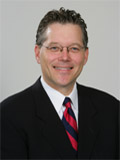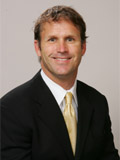|
|
Calling it like they see
it
An interview with Dan Rusanowsky & Jamie
Baker
3/12/07 - By Chris Wood
Think
playing in the NHL is tough? Try verbally calling two-and-a-half straight hours
of the fastest game on earth, all while playing off of another broadcaster, and
doing it in a manner so listeners can actually "see" the game.
 |
| Dan Rusanowsky |
Put an identical question to Sharks Radio Network
broadcasters Dan Rusanowsky and Jamie Baker and chances are you'll get two
totally different answers. Life on the road? "It's wonderful if you want to
visit great cities and go first class," says Rusanowsky, the veteran
play-by-play man now in his 16th broadcast year with Team Teal. "You are around
some of the greatest athletes in the world, and hockey just has a wonderful
culture. For me, it is a special privilege."
No doubt Baker feels
privileged as well, but life on the road for the Sharks pivot man alumnus and
color commentator isn't always so special. "There's no real consistency because
you get into towns the night before and you are leaving less than 24 hours
later. Sometime you don't even know if you are tired," Baker says. "The travel
schedule isn't ideal for anyone, let alone the players. It's not a really fluid
situation, and some nights you are just burnt out and want to do the
room-service thing."
 |
| Jamie Baker |
Indeed, if there's one thing that Rusanowsky and Baker
agree on after 20 years of friendship from NCAA Division 1 hockey at St.
Lawrence University to their current 82-game 2006-2007 broadcast slate, it's
that a little disagreement can be a good thing. "People will sometimes say that
it sounds like we are arguing," Baker explains. "But I think that our shows are
a bit unpredictable, and I think that keeps fans coming back."
Keeping
fans hooked isn't exactly a given in the age of high def TV, broadband video on
demand, and box scores that update in real time. But Rusanowsky and Baker have
a rapport for calling pro hockey games that engages the hard core NHLer and the
casual fan alike. Even to the point where you can actually visualize the game
unfolding. "The whole purpose of what we are trying to do is to let listeners
'see' the game," Rusanowsky says, "and I think that is the way radio should
be."
Pre-Game Prep
Things Rusanowsky and
Baker Agree On
Best
2006-2007 Stanley Cup Contender: San Jose Sharks
Best 2007-2008
Stanley Cup Contender: San Jose Sharks
Best Arena for NHL Radio
Broadcast: HP Pavilion
Best non-tank Arena for NHL Radio Broadcast:
Xcel Energy Center
Longest Game: 2006 Stanley Cup Playoffs Triple
Overtime Game 3 vs. Edmonton
Best Job in the World: NHL Radio
Broadcaster
|
Think you could be on radio? For all of the arm chair
broadcasters out there with sortable stats on the 'net and a perfected "He
shoots, he scores!" howl, you've got another thing coming. Sure, Rusanowsky and
Baker have all the record books at their disposal, and have the PCs powered up,
but keeping on top of all of the player numbers, the stats, the trends, and the
keys to the game comes down to good old-fashioned brain power. "You have to
crystallize everything before the game," Rusanowsky says. "We don't have time
to flip pages. If you are looking down and flipping pages you are missing
action on the ice." Preparation means getting to the rink early-as in morning
skate early-to interview players, prepare and memorize stats and trends, and
begin to develop a loose script to follow as the game naturally develops.
"It takes a few hours," says Baker. "I'd say I spend more time
thinking about my keys to the game probably than anything else, and I'll put
myself in the position of a player or a coach. For Friday night, how do you
beat the Vancouver Canucks? Obviously Luongo was going to be one of the
factors. None of their forwards average over 20 minutes of ice time, so you
want to keep four lines rolling. You want to stay out of the penalty box. Your
power play has got to go because they have the best penalty killing in the NHL.
It's all different from game to game, but we will always come back to the keys
throughout the game, because we're sharing with the listeners what we are
looking for, and ultimately what they are listening for."
While Baker
concentrates on the whys of the game, Rusanowsky is responsible for the whats.
After a twenty-plus years of hockey play-by play, he's got most NHL player
numbers down, but he'll still go through a pre-game ritual of verbalizing
player numbers during the warm up skates. "It's a great way to test yourself,"
he explains. "Friday night I'd look out and just say 'Number 7 Brendan
Morrison, Number 14 Alex Burroughs, Number 16 Trevor Linden.' It only takes a
couple of minutes, and when you practice it that way, the call just starts to
come out naturally."
The Drop of the Puck
And a
natural cadence is the best cadence for Rusanowsky, who says that an NHL
broadcast is a living thing that develops and transpires independent of any
newsman's prep. "I try to keep it as organic as possible, not just because
Jamie is comfortable with it that way, but because it really is a living thing,
the actual call of the game. You want it to be as natural as possible, and you
want to enhance that, because it sounds better."
Did you
know
Dan has been the radio voice of
the Sharks for 16 years
Jamie scored the game winning goal in Game 7 of
San Jose's quarterfinal upset of the Detroit Red Wings in 1994
Both Dan
and Jamie are St Lawrence University Alums
Dan has served as race
commentator for the San Jose Grand Prix
Jamie coaches the Under-12 girls
hockey team at Logitech Ice
Dan produced a radio segment for the Oakland
A's called "Dan's Dugout" in 1993
|
Parallel to the conversation the broadcast team is
having with listeners is the non-verbal communication they have between
themselves. Note passing, kicks to the shin, and a complex collection of hand
gestures lets Baker and Rusanowsky know when the other wants to butt in, needs
to speed things up or slow things down, or just has to go solo for a bit. In
particular, Rusanowsky-who also produces the radio broadcasts-is infamous among
the Sharks Broadcast community for "The Hand," a signal that basically
indicates it's either not a good time to make a comment, or, alternatively,
it's time to wrap it up for a commercial break or some more on-ice action.
As the Sharks play out the stretch and each game becomes more intense,
Baker expects less of The Hand as he voluntarily removes little bit of color
out of the broadcast.
"We'll always take into account who the Sharks
are playing and what's at stake. If it is the middle of December and it's the
5th game we have played against L.A. and the third game in three weeks, I think
we'll keep the show a little lighter," he says. "But coming down the stretch,
you'll notice that I cut out a lot more. I don't want to cut into the play
because there is more at stake, and our broadcasts are going to correlate with
that."
On the Road (Again)
After today's game against
Edmonton, the Sharks head out to Phoenix, one of six road games left (including
a four game stretch next week) that will see Rusanowsky and Baker packing the
suitcases and enduring the rigors of the road. With the playoffs looming,
access to both players and coach's strategies become more difficult, even as
the focus and intensity of games-and the need for on-air information-increases.
"That was one of the things I learned last year during the triple overtime in
Edmonton," Baker says. "When the playoffs come, you've got to be prepared and
ready to talk for an extra two or three periods."
To lighten the load,
the TV and radio broadcast teams will get together for a dinner on the town or
assorted camaraderie and revelry. Rusanowsky even thinks he should write a
restaurant guide for all of the cities-19 different ones this year alone-where
the Sharks make a road stop. Road trips also give the broadcast crew a chance
to visit friends and family. And unlike players, Rusanowsky and Baker bunk
separately and forego the Bosom Buddies routine. "I like the guy," Baker says,
"but not that much!"
Familiarity with the road will likely be a
formidable skill if the Sharks remain within the 4-8 playoff seed scenario, but
both Baker and Rusanowsky uncharacteristically agree that-regardless of where
the Sharks end up in the standings-there's no one in the NHL that wants a first
round match up with San Jose. "This year and/or next year, San Jose is poised
to win it," Rusanowsky says. "And that would be so special for this town. It
would be so important for hockey in the Bay Area, but also just important for
San Jose, too."
Even with most teams in the competitive Western
Conference banner years, Baker takes the odds on Team Teal as well. "Vancouver
is 24-4-4 since Christmas; they think this is a special year. Word out of
Calgary is that they think it is a special year. Minnesota thinks it is a
special year. Anaheim has their guys; they think it is a special year.
Nashville picks up Forsberg; they think it is a special year. It's a special
year for everyone, but the thing I like about the Sharks is that their best
players are bigger than everyone else's best players. I like that in a seven
game series."
In particular, Baker points to the added depth with Bill
Guerin and Craig Rivet, two number one goaltenders, last year's MVP in Joe
Thornton, and depth in the front lines. "If you look at all the teams, who
don't you want to play?" he asks. "I don't know that anyone wants to play the
Sharks. If they get going, if they get on a roll, this could be a fun spring."
As deep as the Sharks go, count on Rusanowsky and Baker to do their
part keeping the all the slap shots, the hip checks, and the red-light,
power-play, goal-scoring action coming across the airwaves and into your living
room, car, or ear buds. If you've yet to listen to a Sharks game on the radio,
make sure to give it a shot as the season unfolds. You'll find an entertainment
more simple yet more sublime than anything HD, Buffalo wings, and a bar full of
hotties has to offer.
And of course, expect some disagreement.
Rusanowsky and Baker often sound like two buddies sitting on the couch, having
the ultimate sports conversation with both each other and the game that they
happen to be watching. "We generally like each other, but we have to disagree,"
Rusanowsky says. "That makes the fan who is listening very comfortable.
Hopefully it drives them in. In the end, we always want to keep things natural,
keep things exciting, and keep things loosened up to get through the long ride
and the haul of it all."
Note: The Sharks Radio Broadcast can be heard
on the Sharks Radio Network, including a flagship broadcast on FM 98.5 KFOX, as
well as on Comcast Digital Cable channel 975. Streaming audio is available via
the Internet at www.sjsharks.com, www.nhl.com, and www.kfox.com.
Contact Chris at rubberwriter@yahoo.com
 |
| What did you think of
this article? Post your comments on the
Feeder Forums |
|
 |
|
| |
|
